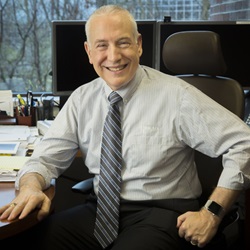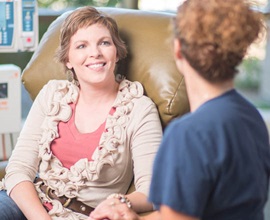Dr. Pate’s Prescription for Change
St. Luke’s Dr. Dan Zuckerman and the search to end alarming colon cancer trends


I have been alarmed by the number of people younger than 40 who are being diagnosed with metastatic colon cancer.
Something has changed.
It used to be that we didn’t see colon cancer until people were in their 50s and beyond. One of my friends who is a health-care executive is dealing with the fact that his young, newly married adult son has stage 4 colon cancer. There was no reason to suspect that he was at high risk for colon cancer, and colon cancer screening typically does not begin until age 50.
What is going on?
St. Luke’s Mountain States Tumor Institute is trying to find out. Here is today’s guest blogger, Dr. Dan Zuckerman, executive medical director for St. Luke’s MSTI and medical director of the St. Luke’s oncology service line, with a report.
- David C. Pate, M.D., J.D.

Twenty years ago, a cousin of mine died of colon cancer in his 30s. He could solve a Rubik’s cube in 12 seconds. He used to laugh at me when I still couldn’t finish one in 12 hours.
Seven years ago at a cancer conference, I talked to a friend from fellowship about a very sad case of a 28-year-old patient of mine with metastatic colon cancer.
She replied, “Yeah, I’ve had a few young patients with colon cancer, too.” Weird.
Four years ago, at the same conference, we exchanged stories about the unusual uptick in colon cancer diagnoses for those in their 20s, 30s and 40s. As physician-scientists, we’re always taught to beware of drawing conclusions from the anecdotes, but the anecdotes were piling up. And they’re not just anecdotes – they’re young people fighting for their lives against colon cancer.
Two years ago, several important reports came out that confirmed what we’d all been seeing. The data showed a rise in colon and rectal cancer rates in young people to near-epidemic levels. In 2018, just within St. Luke’s cancer center, we saw nearly 50 patients younger than 40 with colorectal cancer – consistent with a worldwide trend.
Then, last year, the brother of a close friend died from colon cancer in his 40s. I had taken care of him for two and half years.
This is the type of thing that keeps an oncologist up at night.
It’s not uncommon for people to think, when they encounter a young person with cancer, “Oh, this must be something that’s genetic—you’ve got a bad gene.”
But this isn’t the case. Most studies have shown that no more than 25 percent of cases of young colorectal cancer are due to an inherited genetic abnormality. Therefore, we must conclude it’s something in the environment.
The emerging hypothesis is that something is altering people’s microbiomes, their gut bacteria, in a way that’s promoting carcinogenesis in the colon and rectum. Research seeks to learn what’s affecting the microbiome, which bacteria are emerging as pathogenic and what therapeutic measures can be taken to restore the gut to a healthy microbiome.
St. Luke’s is not waiting around for an answer. We’ve put ourselves in the middle of the international effort to know what’s going on and to solve for it.
Answers of a larger magnitude
St. Luke’s Mountain States Tumor Institute was recently involved in a research study related to the treatment of colorectal cancer, and in the coming year, we’ll have the opportunity for patients to participate in an international study examining the origins of colorectal cancer in young people – and hopefully point us towards prevention.
Our recent partnership was with other academic research hospitals—Dana-Farber Cancer Institute and the Robert H. Lurie Comprehensive Cancer Center at Northwestern University, among others—as the only non-academic hospital in a list of cancer-research heavy-hitters for the SUNSHINE randomized clinical trial.
The SUNSHINE trial measured impact of high-dose versus standard-dose vitamin D supplementation in patients receiving chemotherapy treatments. The trial suggested that high-dose vitamin D may benefit patients with advanced colorectal cancer. St. Luke’s will be participating in the upcoming, larger, phase III trial to try and confirm these results.
In January, researchers at Dana-Farber won Grand Challenge funding from international nonprofit Cancer Research UK for a global research initiative. Their OPTIMISTICC project is the largest coordinated effort in the world looking to discover the underlying causes behind the increased colorectal cancer rates in younger people.
The goal is to enroll more than 17,000 people from around the world and assess how different microbial species alter disease risk; how these different microbes interact specifically with host gut cells and our own immune system; and, finally, how the microbiome can be modulated to actually treat and prevent colorectal cancers.
A project of this magnitude will require a large, diverse sample size, which means samples of varied demographics, geographical locations and stages of cancer development from countries in Europe, Australia, the United States and other developed nations.
How does this apply to patients here at St. Luke’s and around Idaho?
For this kind of project, collaboration is key. St. Luke’s maintains a close research collaboration with the GI oncology group at Dana-Farber, making it easier for St. Luke’s cancer center patients to participate.

Friends and supporters are also in our corner.
One of St. Luke’s amazing philanthropic partners, the Brian Olson Memorial golf tournament, has raised more than $700,000 for St. Luke’s cancer center in the past 18 years. Brian Olson died at 39 of colon cancer, leaving behind a wife and two young boys. At the time, colon cancer at his age was a rarity.
Today, his legacy tournament raises awareness and funds that enable people in the St. Luke’s community to join the international mission to study colorectal cancer in young people, how to treat it and hopefully, even prevent it.
We’ll be enrolling interested patients so that their blood, stool and tumor samples, in addition to clinical and survey data, can be enlisted in this global effort to combat colorectal cancer. This is significant research for our small community to be a part of, with results on a global scale.
I may not have been the fastest at the Rubik’s cube, but I think my cousin would be proud to see me out ahead with St. Luke’s in trying to even the odds for so many young cancer patients.
About The Author

Dr. Dan Zuckerman is the medical director of St. Luke’s Cancer Institute.






